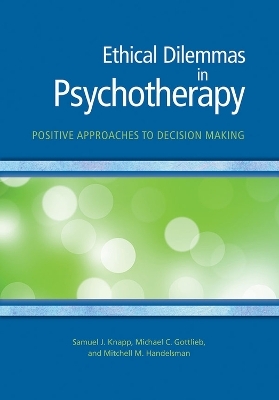
Ethical Dilemmas in Psychotherapy
American Psychological Association (Verlag)
978-1-4338-2012-0 (ISBN)
- Titel z.Zt. nicht lieferbar
- Versandkostenfrei
- Auch auf Rechnung
- Artikel merken
New and experienced psychotherapists alike can find themselves overwhelmed by an ethical quandary where there doesn’t seem to be an easy solution. This book presents positive ethics as a means to overcome such ethical challenges. The positive approach focuses on not just avoiding negative consequences, but reaching the best possible outcomes for both the psychotherapist and the client.
The authors outline a clear decision-making process that is based on three practical strategies:
• ethical decision-making models to make the most ethical decision in a situation where two ethical principles conflict,
• the quality enhancement model for reducing the risk of treatment failure, and
• ethics acculturation model to help therapists incorporate personal ethics into their professional roles.
Numerous vignettes illustrate how to apply positive ethics to many different ethical challenges that psychotherapists will likely encounter in practice.
Samuel J. Knapp, EdD, ABPP, has been the director of professional affairs for the Pennsylvania Psychological Association since 1987. He also teaches ethics in the doctoral program in clinical psychology at the Philadelphia College of Osteopathic Medicine and in the graduate program in counseling psychology at Lehigh University. Dr. Knapp is board certified in counseling psychology and is a fellow of APA Division 31 (State, Provincial and Territorial Psychological Association Affairs). He served as a member of the task force responsible for rewriting the 2002 APA "Ethical Principles of Psychologists and Code of Conduct" and received the first award for ethics education from the APA Ethics Committee. Dr. Knapp has written about 100 peer reviewed articles, made more than 300 professional presentations — mostly on ethics — and written or edited 16 books, including, with Leon VandeCreek, Practical Ethics for Psychologists: A Positive Approach (Knapp & VandeCreek, 2012), now in its second edition. He was the lead author of the second edition of Assessing and Managing Risk in Psychological Practice: An Individualized Approach (Knapp, Younggren, VandeCreek, Harris, & Martin, 2013) and was editor-in-chief of the APA Handbook of Ethics in Psychology. Michael C. Gottlieb, PhD, ABPP, practices forensic psychology in Dallas, Texas, and consults on a nationwide basis. He is a clinical professor at The University of Texas Southwestern Medical Center, where he teaches professional ethics and family systems therapy. Dr. Gottlieb is board certified in family psychology (American Board of Professional Psychology) and is a fellow of the American Psychology/Law Society and four other APA divisions. He has completed terms on APA's Ethics Committee and its Committee on Professional Practice and Standards. An active scholar, Dr. Gottlieb has written or cowritten 60 peer-reviewed articles and book chapters and was an associate editor of the APA Handbook of Ethics in Psychology. Mitchell M. Handelsman, PhD, has been on the faculty of the University of Colorado Denver since 1982, where he is now a professor of psychology and a CU President's Teaching Scholar. He is a nationally acclaimed educator who has won awards from the Council for Advancement and Support of Education and APA Division 2 (Society for the Teaching of Psychology), of which he is a fellow. He has served on ethics committees for several hospitals and professional associations, and has chaired the ethics committees of Rose Medical Center in Denver and the Colorado Psychological Association. Dr. Handelsman served for a year in Washington, DC, as an APA Congressional Science Fellow. He is an associate editor of the APA Handbook of Ethics in Psychology and the coauthor, with Sharon K. Anderson, of Ethics for Psychotherapists and Counselors: A Proactive Approach. Overall, Dr. Handelsman has more than 50 refereed publications, more than 10 book chapters, and more than 160 professional presentations.
Preface
Introduction: Problem, Pitfalls, and Potentials
I. Three Models for Addressing Complex Ethical Situations
What Makes Ethical Choices so Hard?
The Ethical Decision-Making Model
The Quality Enhancement Model
The Ethics Acculturation Model
II. Applications of the Three Models
Professional Competence
Boundary Issues
Informed Consent
General Beneficence With Dangerous Patients
Social Justice
Afterword
References
Index
About the Authors
| Verlagsort | Washington DC |
|---|---|
| Sprache | englisch |
| Maße | 178 x 254 mm |
| Themenwelt | Geisteswissenschaften ► Psychologie |
| Medizin / Pharmazie ► Medizinische Fachgebiete ► Medizinethik | |
| Medizin / Pharmazie ► Medizinische Fachgebiete ► Psychiatrie / Psychotherapie | |
| Studium ► Querschnittsbereiche ► Geschichte / Ethik der Medizin | |
| ISBN-10 | 1-4338-2012-9 / 1433820129 |
| ISBN-13 | 978-1-4338-2012-0 / 9781433820120 |
| Zustand | Neuware |
| Haben Sie eine Frage zum Produkt? |
aus dem Bereich


